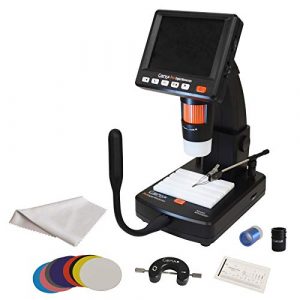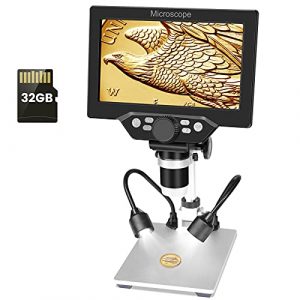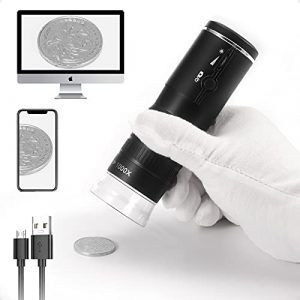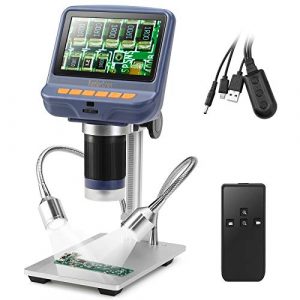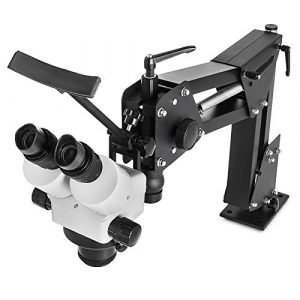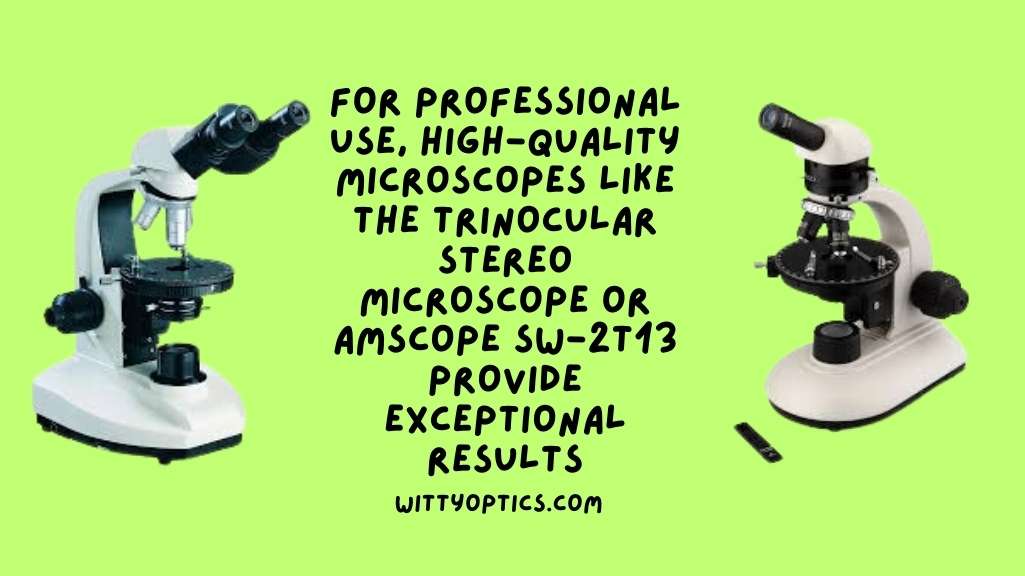As a jewelry maker, I have come to appreciate the importance of having the right tools to work with gemstones. One tool that I have found to be essential in my work is a microscope. A microscope can help you to examine gemstones in detail, identify their characteristics, and determine the best way to work with them. With so many microscopes on the market, it can be difficult to know which one to choose.
Throughout my journey, seeking guidance from seasoned gemologists has been invaluable. Their insights provided a deeper understanding of commonly used magnification levels for specific gem types and examinations. This collaborative learning approach has enhanced my ability to tailor magnification settings to the unique characteristics of each gem, ensuring a comprehensive and accurate analysis in the captivating realm of gemstone inspection.
| Image | Product | Detail | Price |
|---|---|---|---|
 | Carson MicroBrite Plus 60x-120x LED Lighted Pocket Microscope |
| See on Amazon |
 | Elikliv LCD Digital Coin Microscope |
| See on Amazon |
 | AmScope M150 Series Portable Compound Microscope |
| See on Amazon |
 | PalliPartners Compound Microscope for Adults & Kids |
| See on Amazon |
 | Skybasic 50X-1000X Magnification WiFi Portable Handheld Microscopes |
| See on Amazon |
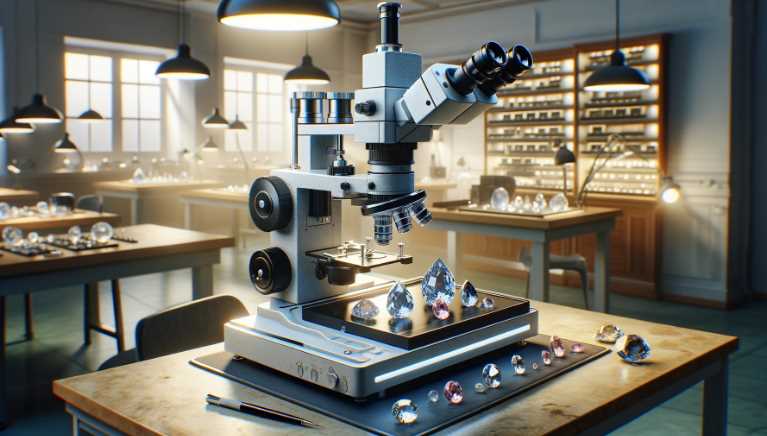
How do you find a gem under a microscope?
To find a gem under a microscope, follow these steps:
- Clean the Gem: Ensure the gem is free from any dirt or debris.
- Use Proper Lighting: Illuminate the gem adequately for better visibility.
- Set the Microscope: Place the gem on the microscope stage and adjust the focus.
- Magnification: Gradually increase the magnification to closely examine the gem.
- Identify Characteristics: Look for unique features like inclusions, color patterns, or any specific identifying marks.
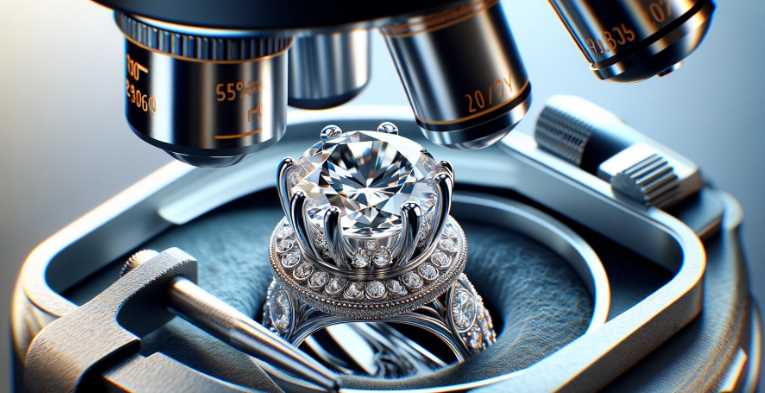
Finding a gem under a microscope requires a systematic approach. Cleaning the gem ensures a clear view, while proper lighting enhances visibility. Placing the gem on the microscope stage and adjusting the focus sets the stage for examination. Incrementally increasing magnification allows for a detailed inspection, helping identify characteristics unique to the gem, such as inclusions or specific color patterns.
| Steps | Description |
|---|---|
| 1. Clean the Gem | Ensure the gem is free from dirt or debris. |
| 2. Use Proper Lighting | Illuminate the gem for better visibility. |
| 3. Set the Microscope | Place the gem on the stage and adjust the focus. |
| 4. Magnification | Gradually increase magnification for a detailed examination. |
| 5. Identify Characteristics | Look for unique features like inclusions or color patterns. |
Gemax Pro Digital Gemstone Jewelry Inspection Microscope
I must say that I have been thoroughly impressed with its capabilities and features. The microscope boasts an innovative design that allows for the convenient sharing of high-definition observations, making it an excellent choice for gemstone and jewelry inspection.
One of the standout features of this microscope is its professional microscopic lens and 3-1/2″ LCD panel, which provides a crystal-clear image that can be easily captured and saved in an SD memory card. Additionally, the microscope can be easily connected to computer screens and TV monitors through a USB connection, making it a versatile tool.
No products found.
The power source of this microscope is also a plus, as it can be powered by a rechargeable lithium battery, a power adapter, or even through a computer’s USB port. The included software is also a great feature, as it supports 12 different languages, including English, German, Spanish, French, Italian, Russian, Portuguese, Dutch, Polish, Japanese, Korean, and Chinese.
While I have been very impressed with this microscope, there are a few things that I do not like about it. One issue I had was that some components were included in the package that were not referenced in the user manual, primarily concerned with creating video. Despite being marketed as a “jewelry inspection magnifying tool”, I found it was not very well suited for that purpose.
Another issue I encountered was that I needed an additional light source to see what I was looking at. However, this minor inconvenience can be easily solved with a separate light source.
In conclusion, the Gemax Pro Digital Microscope (Model MRS009P) is an excellent choice for those in need of a microscope for gemstone and jewelry inspection. With its innovative design, high-definition display, and versatile power sources, this microscope offers a convenient and professional way to examine gemstones and jewelry. Despite some minor drawbacks, the Gemax Pro Digital Microscope is still a top-notch tool for those in the gemstone and jewelry industry.
Micsci 7 inch LCD Digital USB Microscope
I have been using the Micsci 7-inch LCD Digital USB Microscope for a while now, and I am impressed with its performance. This microscope has many features that make it stand out from other models in the market.
One of the main features I love about this microscope is its 7-inch high-definition LCD screen. The large screen provides a broad field of view, which makes it easier to observe objects clearly and conveniently. The screen can be adjusted to different angles, making it convenient for users from different positions to view the object. Additionally, the microscope supports real-time viewing on a computer via USB, which is an excellent feature for collaboration with other users or for observing the object on a larger screen.
- 7 Inch Large LCD Screen: Micsci digital microscope is equipped with a 7 inch high-definition display, whether it is taking photos, videos or image analysis and testing, It can be observed more clearly and conveniently, and easily meets visual needs.7 inch large screen provides a broad field of view for easy viewing.Adjust the angle of the stand, the angle of the screen will change accordingly.it is more convenient for user from different angle to view
- Support Real-Time Viewing on PC: This 7 inch LCD digital microscope also support real-time viewing when connected to a computer via USB cable,and view object on the PC display,The zooming effect is displayed on a larger screen, which is convenient for multiple people to observe at the same time.Please launch the installed software only when your microscope is connected to a PC and ready for observations.(The larger the connected monitor,the higher the magnification)
- Rechargeable Lithium Battery: This 7 inch digital microscope is powered by rechargeable Li-ion battery or powered directly via USB .On a sunny day, Full charge the microscpe,then you can take your family or children to explore the amazing colorful micro world outdoors. Truly portable and independent
- Height and Angel Adjustable Stand: The stand can adjust the distance between the camera and the object,which makes the object distance of this microscope is longer than others,because there is certain operation space.The best object distance is 2cm-10cm. 2cm from the object, the magnifying times will be shorter as the distance increasing. Adjust the angle of the stand,so users can choose the most comfortable and suitable angle from the display
- Save & Output of Images and Videos: This LCD screen digital microscope is equipped with Micro SD card slot .You can save the images and videos obtained during your observations to the card and output.This microscope is equipped with 32G Micro-SD card (Maximum support for 64G Micro SD cards)
Another aspect that I appreciate about this microscope is its rechargeable lithium-ion battery. The microscope can be charged directly via USB, which makes it truly portable and independent. This makes it an excellent tool for outdoor explorations or users who are always on the go.
The stand of this microscope is height and angle adjustable, which gives users more control over the observation distance and angle. The best object distance is 2cm to 10cm, and the longer the distance, the shorter the magnifying times. The stand also provides enough operating space, making it easier to observe objects without hindrance.
One of the most significant advantages of this microscope is its ability to save and output images and videos. The microscope has a Micro SD card slot and a 32G Micro-SD card, which can store the images and videos obtained during observation. The microscope supports Micro-SD cards of up to 64G, a great feature for users who need to store large amounts of data.
The Micsci microscope is equipped with 8 bright adjustable LED lights and 2 extra auxiliary lights, which provide excellent detail and optimal clarity. This makes it possible to capture pictures or video in dark places or low-light conditions. The LED lights can be adjusted to the required intensity, making it easier to observe objects without glare.
Finally, the Micsci microscope has wide applications, making it an excellent tool for a variety of users, including circuit board inspectors, quality control inspectors, watch/clock repairers, textile industry professionals, kids education, biological observation (not suitable for cells), medical professionals, scientific researchers, insect collectors, coin collectors, jewelry enthusiasts, and stamp collectors. This microscope is an excellent gift for children, students, hobbyists, and other users interested in exploring the microscopic world.
The Micsci 7-inch LCD Digital USB Microscope is an excellent tool for observing objects in detail. Its features, such as its 7-inch LCD screen, rechargeable lithium-ion battery, height and angle adjustable stand, and ability to save and output images and videos, make it stand out from other models in the market. However, one of the negative aspects of this microscope is that it lacks more zoom and quality, and the support arm must go further apart to provide more work area. Additionally, the image on the computer screen sometimes shakes a little bit, and the image cannot be seen on the laptop monitor and the microscope screen. Despite these minor flaws, I still give this microscope a rating of 4.8 out of 5.
Ankylin Wireless Digital Microscope Portable Handheld USB Microscope
As an expert user of the Ankylin 7” LCD Digital Microscope, I have been extremely impressed with its features and performance. The dual lenses (digital and microbial) make this microscope versatile and practical for different fields of observation.
The digital lens with 50-500X range is great for observing larger samples like coins, insects, and leaves, while the microbial lens is perfect for observing cells. The 7-inch IPS LCD screen is a great addition, taking away the neck strain from using traditional light or stereo microscopes for extended periods. The screen is rotatable, adjustable up to 270 degrees for more comfortable observation, and connected to a computer for a larger view.
The HD 12 MP camera captures sharp images and videos with true-to-life colors and fine details, making it perfect for examining micro-fabricated parts, large electronic devices, soldering, gems, and insects. The 11-LED bright illumination provides excellent detail and optimal clarity, even in dark areas. The rechargeable battery (2 hours of working time) or USB connection makes it convenient to take on the go and explore the miniature world.
One of the features I particularly appreciate is the back-and-forth adjustment bracket that allows for height adjustments and provides more focal distance. This reduces vertical reflections and enables the observation of various size objects, improving work efficiency. The 32 GB SD card is a great bonus, allowing you to save and share photos and videos with friends and family.
- Dual Lenses For Versatile Uses - This new model electronic microscope is equipped with digital lens and microbial lens. You can observe minute details on larger samples like coins, insects, leaves, etc. wiht the 50-500X range digital lens (“Lens 1”). And The microbial lens(No.2) allows you to observe cells. It is very practical and convenient to meet your requirements of different fields with one set only.
- 7-inch IPS LCD Screen - Ankylin LCD digital microscopes come with a large 7″ LED screen that takes away the neck strain you get by using a light microscope or stereo microscope for a long time. And the screen is also rotatable, enabling you to observe the specimen more comfortably. You can adjust the tilt up to 270 degrees for easy usage.
- HD 12 MP Camera - The HD 12 MP camera captures sharp images and videos with true-to-life colors and fine details (4023*3024 for images and 1920*1080 for videos). It makes sure to give accurate, magnified details for observation. You can examine from micro-fabricated parts to large electronic devices like electronic circuits, soldering, gems, insects, etc.
- Connect to PC for a Large View - Besides the widescreen, this coin magnifier enables you easily observe specimen images and videos on a computer by connecting through the USB cable. No extra software download needed, just run the default APPs "Windows Camera" for Windows 7/8/10/11 and "Photo Booth" for iMac/MacBook 11.0 or higher. It's excellent for application in industries, schools, colleges, and to obtain data to present at conferences.
- Height Adjusts to Provide More Focal Distance - This coin magnifier has a back and forth adjustment bracket. You can adjust the angle and height to increase or decrease the distance between the lens and the object. It helps reduce vertical reflections and observe various size objects. Enhance work efficiency.
Although the magnification claims may be suspect, I have found that the images captured are not completely sharp (less than 1MP), but they still offer much greater detail than what can be seen with the naked eye.
In conclusion, the Ankylin 7” LCD Digital Microscope is the best digital microscope I have ever used, especially considering the price. I highly recommend it for anyone in need of a high-quality microscope for their work or hobby.
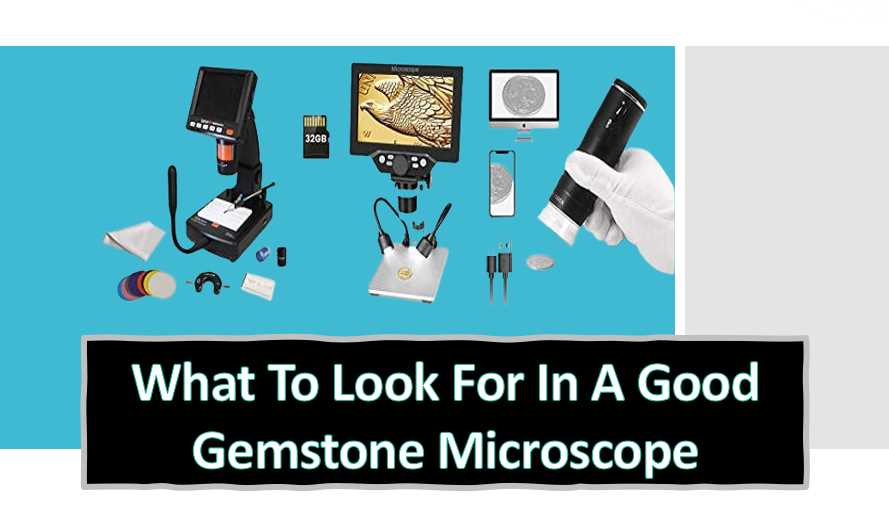
Koolertron 4.3 inch 1080P LCD Digital USB Microscope
I recently purchased the Koolertron 4.3 inch 1080P LCD Digital USB Microscope, and I must say, I am impressed with its performance. This microscope is an affordable option for anyone looking to perform detailed inspections and repairs, whether it be in the field of electronics, jewelry, or biology.
The Koolertron microscope boasts a 4.3-inch full HD LCD screen that offers 10x-220x continuous magnification. The microscope is equipped with an infrared remote control for easier operation, an adjustable stand that can be adjusted to fit your preferred height, and an 8 LED illumination system with adjustable intensity control. Additionally, the microscope also has two fill lights on both sides that can be adjusted freely, and the brightness can be adjusted by the dimmer switch.
One of the standout features of this microscope is its wide range of applications. With this device, you can solve problems in at least 6 fields, such as PCB inspection, insect observation, jewelry appraisal, cell analysis, LED screen repair, and watch or clock repair. The design of this microscope is ergonomic, providing users with a better experience.
- 4.3inch full HD LCD screen.10x-220X continuous magnification.Infrared remote control for easier operation
- High-quality height-adjustable stand. Can adjust the magnification and the distance between the camera and the object by the controller
- UV filter Assembly, not only protect the lens but also reduce the reflection and stray lights.Images and videos obtained during your observations are saved to a microSD card, Maximum supporting 32GB (Please remove the lens protection cover and install the UV filter when using the microscope.)
- 8 LED illumination with adjustable intensity control, allowing you to set the desired level of illumination, and a measuring scale.Equipped with two fill lights on both sides that can be adjusted freely, and the brightness can be adjusted by the dimmer switch.
- The wide range of applications, one microscope can solve problems in at least 6 fields, such as PCB, Insect, Jewelry, Cells, LED Screen, Watch/Clock. And its appearance design combines more ergonomic consideration, provides users with better experience.
One aspect I particularly like about this model is the picture quality and infinite zoom. The image quality is flawless, and the zoom will focus clearly at any distance. This makes it an ideal tool for soldering small components or examining intricate details of a piece of jewelry.
On the downside, I was disappointed that this microscope is not compatible with modern systems such as a Plug and Play device. It requires a driver for the system to use it, and the company’s website is not very helpful in this regard. Additionally, the listing only mentions a program called amcap, but it does not explain how to acquire it.
In conclusion, I highly recommend the Koolertron 4.3 inch 1080P LCD Digital USB Microscope for anyone looking for an affordable and versatile microscope. Despite its compatibility issues, the picture quality and infinite zoom make it a great tool for a variety of applications. At under $100, it is an excellent value for the money and far exceeded my expectations.
VEVOR Micro Inlaid Mirror Multi-Directional Microscope
I can say that this microscope is a fantastic tool for anyone in the jewelry industry, whether you are a student or a professional. With a magnification range of 7X to 45X and a continuous zoom feature, this microscope provides clear and crisp images, making it ideal for gemstone setting and other detailed work.
One of the things that I particularly like about this microscope is its spring bracket, which offers a flexible telescopic mechanical focusing mechanism. This makes the operation of the microscope much more convenient and helps to exempt operator fatigue, improving work efficiency. The unique headrest frame of the micro inlaid mirror is a great touch that provides extra comfort during extended work sessions.
Another feature that I find very useful is the wide-angle vision technology that the microscope uses. This provides a large view field, making it easier to operate and ensuring a clear view of your workpiece. Additionally, the durability of the microscope parts has been greatly improved after optical treatment, which means that this microscope will last for a long time and provide reliable performance.
- Main Parameter: Name: Micro inlaid mirror. Machine objective lens: 0.5X/165MM. Machine eyepiece: WF10X/20MM. Binocular pupil distance: Pupil distance adjustment 54-76 mm (2.13-2.99 inch). Field of view: 5.1-33 mm (0.2-1.3 inch).
- Continuous Zoom: Long working distance (95-300 mm), the micro inlaid mirror features 7X-45X continuous zoom, can be equipped with micro telescopic adjustment device.
- Spring Bracket: Flexible telescopic mechanical focusing mechanism makes the operation more convenient. The unique head rest frame of the micro inlaid mirror helps the operator to exempt fatigue and improve work efficiency.
- Features: The micro inlaid mirror using a wide-angle vision technology, continuous zoom stereo microscope head, high-resolution, large view field, easy to operate. The durability of the micro inlaid mirror parts has been improved greatly after optical treatment.
- Universal: The sections gimbals universal brackets of the micro inlaid mirror, with aesthetic and practical structure, are suitable for variety of height, azimuth work and working environment.
The sections gimbals universal brackets of the microscope are also a great feature. With an aesthetic and practical structure, these brackets are suitable for a variety of height, azimuth work, and working environments. This means that you can use the microscope in different settings and still enjoy the same level of comfort and convenience.
Unfortunately, when my VEVOR Micro Inlaid Mirror Microscope arrived, the box had holes in it, and some of the parts were missing, including the eye cup and nuts, and washers. However, after setting it up, I can say that the microscope works precisely the same as the high-end microscope on the hammer bench next to mine. The only difference is how you turn the knob to zoom in and out.
In conclusion, I would highly recommend the VEVOR Micro Inlaid Mirror Microscope to anyone in the jewelry industry. With its high-quality optics, flexible focusing mechanism, and universal brackets, this microscope is an excellent tool that provides unbeatable value for its price. Whether you are a student or a professional, this microscope is a fantastic choice that will help you achieve great results.
4 Factors to consider when choosing a gemstone microscope
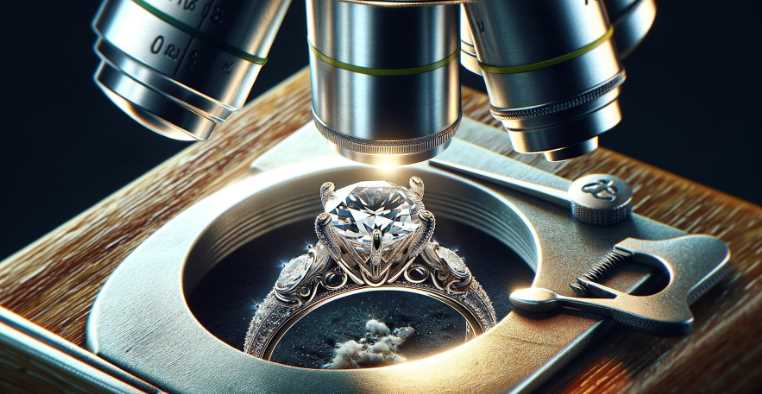
As a jewelry maker, one of the most important tools I rely on is a microscope for examining and working with gemstones. There are many different options available on the market, ranging from traditional optical microscopes to digital microscopes with LCD screens.
In this buying guide, I will compare and contrast four different microscopes for gemstones: the Gemax Pro Digital Gemstone Jewelry Inspection Microscope, the Micsci 7 inch LCD Digital USB Microscope, the Koolertron 4.3 inch 1080P LCD Digital USB Microscope, and the Ankylin Wireless Digital Microscope.
I will evaluate these microscopes based on their magnification, price, LCD screen, illumination, rechargeable battery, dual lenses for versatile uses, and optics. I will also provide my personal experience using these models for jewelry making, as well as my overall opinion and comfortability with each microscope.
Magnification
One of the most important factors to consider when choosing a microscope for gemstones is magnification. The Gemax Pro Digital Gemstone Jewelry Inspection Microscope offers a magnification range of 10x to 200x, while the Micsci 7 inch LCD Digital USB Microscope has a magnification range of 10x to 1200x. The Koolertron 4.3 inch 1080P LCD Digital USB Microscope has a magnification range of 1x to 600x, and the Ankylin Wireless Digital Microscope offers a magnification range of 50x to 1000x.
Personally, I have found that a magnification range of at least 10x to 200x is necessary for working with gemstones, as it allows you to see small details and imperfections. However, I have found that higher magnification ranges can be useful for examining tiny details.
Price
The price of a microscope is also an important consideration. The Gemax Pro Digital Gemstone Jewelry Inspection Microscope is the most expensive option on this list, costing around $600. The Micsci 7 inch LCD Digital USB Microscope is also a bit pricey, costing around $300. The Koolertron 4.3 inch 1080P LCD Digital USB Microscope is more affordable, with a price point of around $100. The Ankylin Wireless Digital Microscope is the least expensive option on this list, with a price point of around $50.
In my experience, the price of a microscope is often reflective of its quality and features. However, it’s important to consider your budget and the specific features that are most important to you.
LCD Screen
Some microscopes come with LCD screens, which can be useful for examining gemstones without having to connect the microscope to a computer or other external screen. The Gemax Pro Digital Gemstone Jewelry Inspection Microscope and the Micsci 7 inch LCD Digital USB Microscope both have built-in LCD screens, while the Koolertron 4.3 inch 1080P LCD Digital USB Microscope and the Ankylin Wireless Digital Microscope require an external screen to view images.
Personally, I have found that a built-in LCD screen can be more convenient and make it easier to work with gemstones. However, external screens can also provide a larger viewing area and more flexibility in terms of placement.
Illumination
Proper illumination is essential when working with gemstones, as it can help you to see details and imperfections more clearly. The Gemax Pro Digital Gemstone Jewelry Inspection Microscope and the Micsci 7 inch LCD Digital USB Microscope both come with built-in LED lights for illumination, while the Koolertron 4.3 inch 1080P LCD Digital USB Microscope and the Ankylin
How do you determine the magnification you need for gemstone inspection?
Choosing the right magnification for gemstone inspection is a critical aspect of obtaining accurate and detailed information about a gem’s characteristics. Here’s a step-by-step guide to determining the appropriate magnification:
| Step | Explanation |
|---|---|
| Identify Inspection Goals | Clearly define the specific details you aim to observe, such as inclusions, color zoning, or surface features, as different magnifications cater to distinct aspects. |
| Consider Gem Size | Larger gems may require lower magnifications to fit the entire stone within the field of view, while smaller gems may necessitate higher magnifications for detailed examination. |
| Assess Inclusion Size | If the primary focus is on identifying and studying inclusions, choose a magnification that allows for clear visibility and analysis of these microscopic features. |
| Determine Microscopic Detail | Consider the level of detail required for your examination. Higher magnifications are suitable for intricate assessments, while lower magnifications provide a broader view. |
| Factor in Instrument Limits | Be aware of the maximum magnification capabilities of your microscope, as exceeding these limits may result in image distortion or reduced clarity. |
| Seek Professional Guidance | Consult experienced gemologists or experts to get insights into the magnification levels commonly used for specific gem types and examinations. |
What types of gemstones can you see with a microscope?
With a microscope, you can see a variety of gemstones and examine their characteristics and features more closely. Some examples of gemstones that can be inspected using a microscope include:
- Diamonds: A microscope can be used to examine the clarity and inclusions of a diamond, as well as the cut and overall quality.
- Colored gemstones: A microscope can help you identify the internal and external characteristics of colored gemstones, such as their inclusions, color, and clarity.
- Pearls: Microscopes can be used to examine the surface and internal characteristics of pearls, such as their luster, color, and nacre thickness.
- Opals: A microscope can be used to inspect the internal structure of opals and identify any inclusions or patterns.
In general, a microscope can be a useful tool for examining any gemstone, allowing you to see its features and characteristics more closely and accurately than with the naked eye.
How do you use a microscope to identify gemstones?
Using a microscope to identify gemstones can be a helpful technique, particularly for identifying the internal and external characteristics of the gemstone. Here are some steps to follow when using a microscope for gemstone identification:
- Choose the right magnification: As we discussed earlier, the magnification you use will depend on the size and type of gemstone you are examining.
- Examine the external characteristics: Begin by examining the external features of the gemstone, such as its color, shape, and texture. Take note of any distinguishing characteristics that could help identify the gemstone.
- Inspect the internal characteristics: Next, look for any inclusions or other features inside the gemstone. This can include identifying specific crystal structures or patterns, as well as looking for any cracks, bubbles, or other flaws that may impact the value or quality of the gemstone.
- Use additional testing methods: In some cases, additional testing methods may be necessary to fully identify a gemstone. This can include using specialized equipment, such as a refractometer or spectroscope, to identify specific properties of the gemstone.
- Make a determination: Based on the external and internal characteristics, as well as any additional testing methods used, you can make a determination about the type of gemstone you are looking at.
Overall, using a microscope for gemstone identification can be a helpful technique, particularly for identifying the internal characteristics of the gemstone that may not be visible to the naked eye.
What are the key features of specialized microscopes used in exploring gemstones?
When delving into the world of gemstones with specialized microscopes, it’s crucial to understand the key features that make these instruments indispensable. Here’s a breakdown of the main components:
| Feature | Description |
|---|---|
| Magnification | Specialized gemstone microscopes boast high magnification capabilities, allowing for detailed examination of gem structures at the microscopic level. |
| Lighting | Advanced lighting systems, such as LED illumination, provide optimal visibility, ensuring gemstone features are well-lit for accurate analysis. |
| Polarization | Many microscopes incorporate polarization features, aiding gemologists in identifying unique optical characteristics within gemstones. |
| Digital Imaging | Integration of digital imaging technology enables the capture of high-resolution images, facilitating documentation and analysis. |
How do specialized microscopes enhance gemstone identification?
Specialized microscopes play a pivotal role in gemstone identification, offering gemologists a closer look at intricate details. Here’s how:
| Aspect | Impact |
|---|---|
| Inclusion Identification | Microscopes reveal internal inclusions, aiding gemologists in authenticating and categorizing gemstones based on these distinctive features. |
| Color Grading | Enhanced color clarity under magnification assists gemologists in accurate color grading, crucial for determining a gemstone’s value. |
| Surface Examination | Microscopic examination helps identify surface characteristics, contributing to the overall assessment of gemstone quality. |
H3: Can specialized microscopes detect synthetic gemstones?
Indeed, specialized microscopes are invaluable tools for distinguishing natural gemstones from synthetic counterparts. Here’s how they achieve this:
| Method | Explanation |
|---|---|
| Flux Inclusion Analysis | Microscopes aid in identifying specific flux inclusions, providing clues to differentiate between natural and synthetic gemstones. |
| Growth Patterns | Examining growth patterns at the microscopic level allows gemologists to spot inconsistencies that may indicate synthetic origin. |
| UV Fluorescence Testing | Some microscopes come equipped with UV capabilities, enabling gemologists to detect fluorescence patterns characteristic of synthetic gems. |
H3: How do gemologists use microscopes to assess gemstone quality?
Gemstone quality assessment involves a meticulous examination of various factors, and specialized microscopes are essential in this process. Here’s a breakdown:
| Quality Factor | Microscopic Evaluation |
|---|---|
| Clarity | Microscopes reveal internal and external features, helping gemologists assess clarity by identifying inclusions and blemishes. |
| Cut | Detailed microscopic examination aids in evaluating the precision and quality of a gemstone’s cut, impacting its brilliance and overall appeal. |
| Color | Microscopes assist in precise color grading, ensuring accurate evaluation of a gemstone’s color intensity and distribution. |
Are there any limitations to using specialized microscopes in gemstone analysis?
While specialized microscopes are indispensable in gemstone analysis, they do have some limitations. Here’s an overview:
| Limitation | Explanation |
|---|---|
| Size Constraints | Microscopes may pose challenges when examining larger gemstones due to size limitations within the microscope stage. |
| Cost | High-quality specialized microscopes can be expensive, making them less accessible for smaller gemology labs or individual gem enthusiasts. |
| Skill Requirement | Effective use of microscopes in gemstone analysis requires specialized training, and proficiency develops over time with experience. |
Final Words
Setting up the microscope is crucial, allowing for precise focus and adjustment. Gradually increasing magnification unveils the gem’s secrets, from subtle inclusions to vibrant color patterns. Identifying these characteristics not only aids in gemstone authentication but also enhances appreciation for their natural beauty.
In the realm of gemology, microscopes are indispensable tools, enabling gemologists and enthusiasts alike to delve into the unique qualities that make each gemstone a work of art. The final words on exploring gemstones with microscopes resonate with the idea that these instruments serve as gateways to a world where the smallest details contribute to the grandeur of these precious stones.

I am an enthusiastic student of optics, so I may be biased when I say that optics is one of the most critical fields. It doesn’t matter what type of optics you are talking about – optics for astronomy, medicine, engineering, or pleasure – all types are essential.
Last update on 2025-10-07 / Affiliate links / Images from Amazon Product Advertising API
Table of Contents
